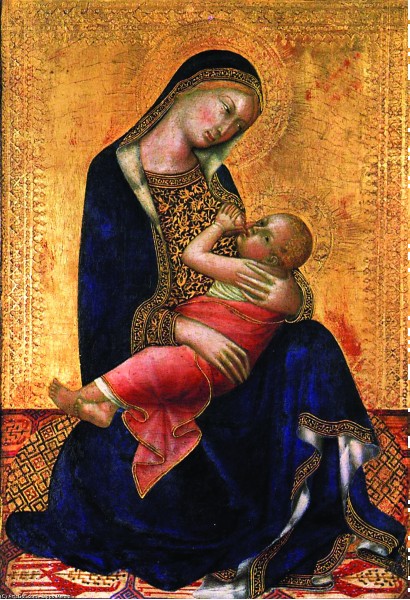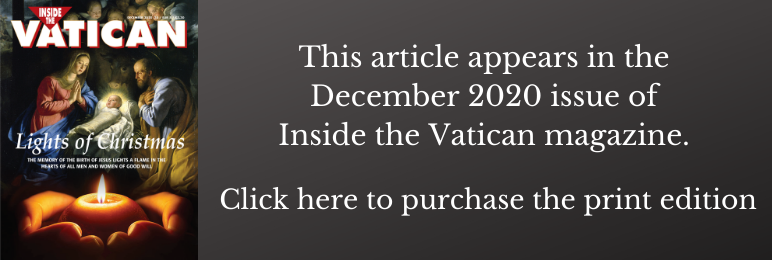Mary is the true Canaan, the land flowing with milk and honey
By Anthony Esolen

Madonna and Child, by Lippo Memmi, now in the Gemäldegalerie, Berlin, Germany
“Blessed be the womb that bore you,” cried a woman from the crowd, “and the breasts that you sucked!” But Jesus said, “Blessed rather are those who hear the word of God and keep it!” (Lk. 11:27-28)
Many a Christian artist in the Middle Ages dwelt lovingly upon that scene of intimate love, Mary giving the breast to the Child Jesus. I am looking at a painting by the Sienese master Lippo Memmi, with Mary in a rich blue silken robe fringed with gold, echoing the psalmist as he describes the daughter of the king, “decked in her chamber with gold-woven robes, in many-colored robes” (Ps. 45:13-14).
Memmi shows Mary as seated, though we hardly see the chair: she herself is as the throne for the Child Jesus. The floor is decorated with patterns of red and gold and blue, and the background is a textured gold, with the haloes above the heads of Mary and Jesus set upon it – thin layers of tin covered with gold leaf and delicately punched to form the design of the circles and the rays. Mary looks upon the Child Jesus with a steady gaze of wisdom and love, while Jesus, nursing, looks away from her and toward us. The faces bear the features of the Byzantine style characteristic in medieval Siena, and the forms are solid, static, suggesting not change and motion but stillness and eternity.
Such a work may not be to our taste now. We want what we call realism, meaning a concentration on what the particular woman and child might have looked like, in a stable or a poor room in Bethlehem. There is nothing wrong with such realism, so long as it does not obscure the truth – so long as it does not let slip what is most real. Mary knew that Jesus was the Son of God. What exactly that meant to her, we are not told, though we are given to know that the child in her womb inspired her to a flight of Hebrew poetry, the Magnificat; and if anyone should say, “Luke has put those words into her mouth,” I should very much like that person to compose a poem in a language he does not know so as then to translate it into his mother tongue, and afterwards to tell us why he would do so pointless a thing in the first place. If anyone should say, “It is impossible to suppose that a mere village woman would compose a poem,” I reply that he knows little about villagers and the songs they compose and sing.

Detail of the painting Madonna of the Magnificat by Sandro Botticelli, Uffizi Gallery, Florence
For Mary who “kept all these things in her heart” (Lk. 2:51) – the word suggests watching, guarding, keeping a lookout – is our great exemplar of someone who hears the word of God and keeps it. The word of God is real and solid, and all that we do and say, and all the things of the world that we strive for as if they were treasure, are shadows by comparison. When Jesus replies to the enthusiastic woman (whose words, by the way, make a fine verse of Semitic poetry), he does not mean to suggest that his mother Mary is not blessed, or that it was not a good and sacred thing that he took milk from her breast. For Mary is herself one who hears the word of God and keeps it, and that, more than her earthly motherhood, is what makes her blessed. The Greek word that Luke uses here is quite strong: it is what you do when you have something inestimably precious. You set a guard on it, a sentry. We should think of Mary as turning her whole heart in concentration upon the Word of God, and upon the incarnate Word who is her child.
Mary, the first to adore the Lord come to dwell among us in the flesh, is the true Canaan, the land flowing with milk and honey. She gives to the Child Jesus the fullness of her motherly body, but that is possible only because she has taken into her heart and mind and soul and strength the word of God. Many a painting of the Annunciation shows her seated, with an open book in her lap, prepared, without being aware of it, to fill the great role she will be called to play. Consider then the interchange: the word, as known from the Scriptures, comes to Mary, who hears it and treasures it, and so she opens herself to the strange and fearful message of the angel. The Word of God comes to dwell within her, and when she brings him forth into the world, he takes nourishment from her. So must he continue to do, and from his foster-father Joseph as well: to learn to walk, to speak, to play, to work, as he “grew and became strong, filled with wisdom” (Lk. 2:40). But with every step he takes, with every word he speaks, he gives, even to the uttermost: “For my flesh is food indeed, and my blood is drink indeed” (Jn. 6:55).
Milk, honey, wine, all rich, all sweet; and so is the word of God. “How sweet are your words to my taste,” cries the psalmist, “sweeter than honey to my mouth!” (Ps. 119:103) When we prefer our sins and the wisdom of the world, we are like people so used to brackish water that we have forgotten what fresh water is. When we pretend that we can stand in judgment upon the word of God, we do not keep watch over it as Mary did; as if we were content to eat any old thing regardless of whether it was true food, or to feed our children any old thing regardless of whether it would make them strong or sickly. Let us not do so. Let us learn from Mary, and be nourished by her example.








Facebook Comments